THE GIVEAWAY
Because Jetpens is a pretty chill company (they were the main factor that kindled my love for fountain pens), they are also giving away a bottle of Iroshizuku Fuyu-gaki Winter Persimmon exclusively to my readers. So head on to their website for a chance to win. NOTE: you will need to subscribe (or already be a subscriber) to Jetpens' newsletter before you can submit your entry for the giveaway. For existing subscribers, just enter your email and hit "Submit". If you are not already a subscriber there's a handy "Subscribe to our newsletter" box on the bottom right side. The giveaway runs from 10/29 6PM PST to 11/05 11:59PM PST. Good luck!
For many in the fountain pen world, Iroshizuku ink is perceived as being somewhat of an unicorn: rare, precious and with magical qualities. While Iroshizuku seems to be a brand of its own (that's what I thought when I first heard about it) it is actually produced by Pilot. It is to Pilot what Lexus is to Toyota: a more refined and luxurious sub-brand. As a result, the price is also much higher than its regular stablemates who go under the Pilot label.
I'm happy to finally be able to test one of these lovely inks. Iroshizuku Fuyu-gaki Winter Persimmon is essentially a vermillion ink but there's more to it than that. Let's explore some of its properties.
For this review I went outside the norm, because I had access to more ink, and pulled out a trio of pens: Noodler's Ahab, Lamy AL-Star (with EF, 1.1mm, 1.5mm and 1.9mm italics) and TWSBI Diamond 530 (with EF and B nibs).
Bottle and pricing
Refinement starts on the outside and it isn't a stretch to say that Iroshizuku inks come in very elegant bottles. This is easily the sexiest ink bottle I've handled, apart from the rather unique J Herbin 1670 Rouge Hematite but I'm not sure that's a fair comparison considering the 1670 is a limited edition. Nonetheless, the Iroshizuku bottle looks a bit like something out of a Swarovski catalog. Notice however that while it seems big, the bottle only holds 50ml because the bottom is thick glass, but this makes it hefty and stable on your desk.
Another nice touch in the bottle's design is the conical cavity at the bottom designed for the nib to fit in when you are filling your pen. This made me actually fill the pens used in this review the way they are meant to, as opposed to using a syringe as I normally do.
All this comes at a price. Iroshizuku is perhaps the most expensive mainstream ink, at $28 for 50ml / 1.7oz, or $0.56 per milliliter. Compare this with something regular like Noodler's Ink which is only about $0.14 / ml. But is it worth it? While the cool packaging certainly adds to the cost, the ink itself does a great job in justifying its price. Personally, it's a bit much for me, so I'm not sure I'd buy a full bottle, but that's because I don't write/draw enough to justify that. For heavy fountain pen users it's another story. Nevertheless, I'm sorely tempted...
Color and saturation
Iroshizuku Fuyu-gaki Persimmon is, as mentioned, a vermillion ink. Vermillion is a color between dark orange and red, with a warm tone. To my eyes it looks more orange than red, hence the classification under the Orange Inks category. It's a beautiful color, definitely one that I haven't encountered before in a fountain pen ink. It is rich, vibrant and saturated.
Compared to other inks that I have tested, it is darker and more fiery than both Diamine Orange and Noodler's Dragon's Napalm to which it bears a passing resemblance.
Shading
It's only proper for such a regal ink to feature at least some shading and Iroshizuku Fuyu-gaki doesn't disappoint. I would say that the amount of shading is above average and this makes the ink look almost like watercolor, when applied in liberal amounts such as the q-tip samples shown below.
Thicker nibs work best to show of the shading properties and that's one reason why I prefered the broad nibs versus EFs, for this ink.
Feathering
In normal use (with a nib, that is) there is no feathering. I have noticed, however, that there is a bit when using the J Herbin glass dip pen. That's excusable though, for two reasons: this is a wet ink and cheap paper tends to act like a sponge, and most inks act the same under similar circumstances.
Bleedthrough
Fuyu-gaki doesn't bleed through the paper but it ghosts a little with the dip pen. I'm guessing because of its higher-than-average saturation you can see its shadow even on heavier paper such as the Rhodia 80g but the reverse side remains eminently usable. Even the cheap photocopy paper can be used on both sides.
Flow, lubrication and smoothness
Iroshizuku Fuyu-gaki flows well in the pens I've tested but...
Maybe it's the fact that in recent times I've taken a liking to thicker nibs, or that my particular fine nibs aren't that great, but I actively disliked how both the TWSBI and the Lamy wrote with their respective EF nibs. The both felt scratchy and dry. Notice that the line from the Lamy EF looks rather thick in comparison. On the other hand, it's a real joy to use the broad nib in the TWSBI and all 3 italics for the Lamy. The Fuyu-gaki flows wet and smooth in these nibs.
Noodler's Ahab sits somewhere in the middle. It had some flow issues when flexing, which caused railroading. The ink also dried up in between uses. But I think that's a problem with the pen itself. I really wish I could get my hands on a proper vintage flex pen for $10 or so. Yeah, never gonna happen.
Drying time
I tested Fuyu-gaki's drying time in a less-than-scientific manner, as I always do, with whatever nib is handy at the moment. For this test I used the TWSBI B. Since the ink flows wet in this nib, it took quite a while before it dried on Rhodia 80g paper, somewhere north of 30 seconds. On cheap, absorbent paper, however, it dried quickly, closer to 5 seconds than 10.
Smearing when dry
None.
Water resistance
The documentation doesn't mention anything about Iroshizuku Fuyu-gaki's water resistance and, as it's usually the case, it turns out the ink is entirely vulnerable to water. A minute under water diffuses this ink into illegibility. No big deal though, that wasn't a selling point.
Conclusion
Pilot's Iroshizuku Fuyu-gaki Persimmon is a beautiful, polarizing vermillion ink, rich in appearance and smooth in flow. It has some very nice shading especially if used with broader nibs which can be a perk if broad nibs are what you prefer because personally I don't think fine nibs do it justice. On the other hand this is also an Iroshizuku, which puts it way above the crowd in terms of price. Is it worth buying? That's up to you to decide. While a Toyota provides sufficient utility to most people, there are plenty who prefer (and can afford) a Lexus. One thing is certain: it's hard to find this combination of color/shading/smoothness in lesser inks.
Below are the two samples written on photocopy and Rhodia 80g, respectively.

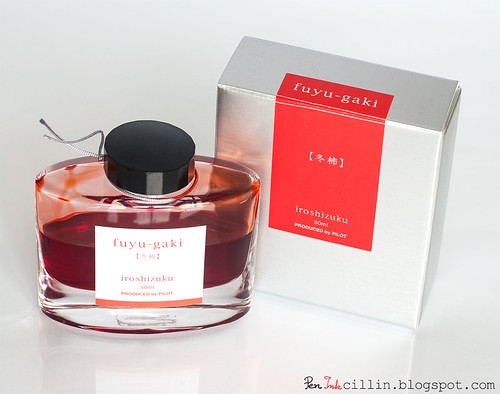
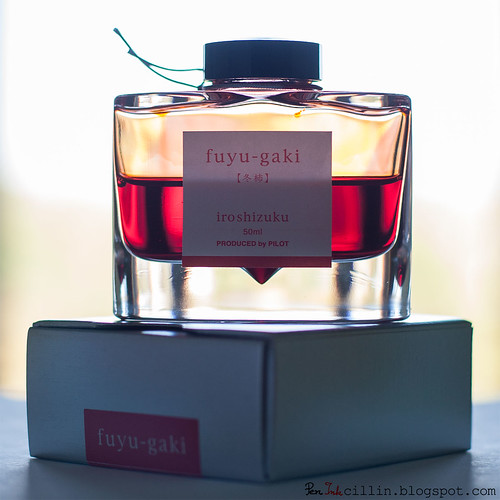
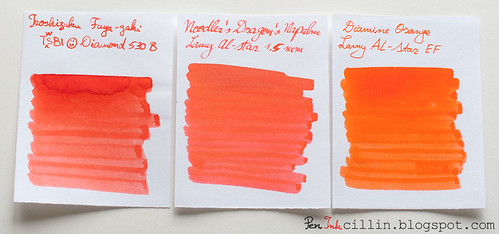
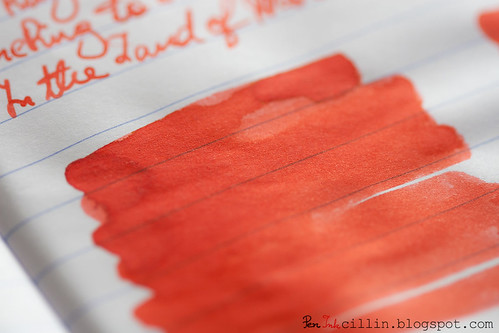
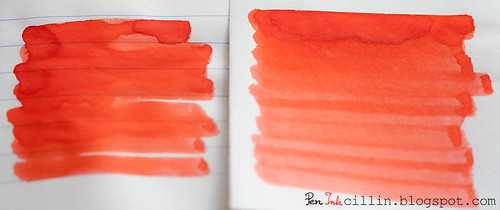
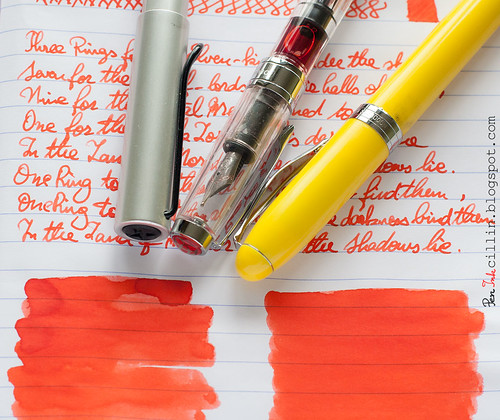
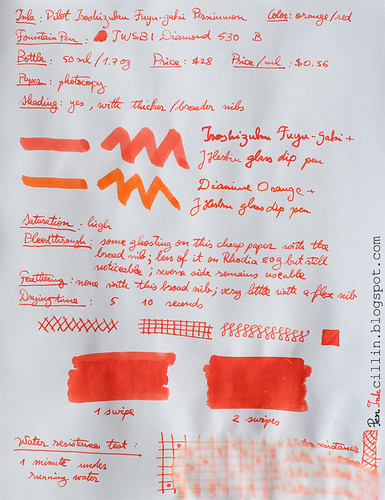
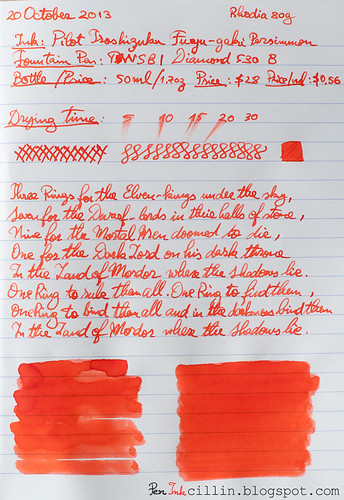
An excellent review (as always). The color really intrigues me, though I cannot imagine a practical application for it. The giveaway is a great contest and, like you, I find Jet Pens to be one of my preferred on-line pen/ink shops.
ReplyDeleteThanks Freddy! To be fair, a lot of the inks I've tested don't have a "practical application" per se but that's if you restrict yourself to writing. There's a gentleman on Flickr by the name of Pete Scully who makes some amazing sketches using color ink among other things. Oh and I heard some teachers love Fuyu-gaki for grading papers.
ReplyDeleteThanks Freddy! To be fair, a lot of the inks I've tested don't have a "practical application" per se but that's if you restrict yourself to writing. There's a gentleman on Flickr by the name of Pete Scully who makes some amazing sketches using color ink among other things. Oh and I heard some teachers love Fuyu-gaki for grading papers. Even I can use it at work to jot down notes.
ReplyDeleteThanks for the comprehensive review. I love this color, it would be lovely for my autumn letter writing.
ReplyDeleteOh, I didn't say I didn't want it, LOL! I have many different inks that probably could not be used in the day to day business world. However, because I am retired, I write with any color I darn well want from purples, pinks, yellows, and oranges to browns, turquoises, grays, and reds. Oh yes, sometimes I even use blues and blacks. ;-)
ReplyDeleteHaha blues and blacks are the least used when you have a rainbow of colors. I'm also guilty of that!
ReplyDeleteI'm glad you liked and good luck in winning a bottle!
ReplyDeleteI've liked this one for a while. How long did it take you to get the bottle half-empty like that?
ReplyDeleteI filled all the 3 pens I used for the review and I also used a little for the swabs. But the bottle I got from Jetpens wasn't full.
ReplyDeleteI bought my father and brother journals for xmas and need to get some high quality pens to complete the gifts. I may get some fountain pens and ink - headed to Jet Pens now.... Thanks for sharing and thanks for the giveaway!
ReplyDeleteMan, I don't know; I just splurged on a bottle and I've been pretty disappointed. I researched reds and orange reds exhaustively looking for a vibrant ink to do longhand editing, but this ink is remarkably dull on the page. I'm sure the color would be charming were I not so disappointed, but still . . . that disappointment is tough to get past.
ReplyDeleteSorry to hear that. Are you perhaps using a thin nib which doesn't show off the shading?
ReplyDeleteI'm not going to make the mistake of buying full ink bottles before trying a sample first. I did this at the beginning, getting excited about an ink before trying it, and then spending money on a bottle, only to find out that I wasn't too crazy about it once I started using it.